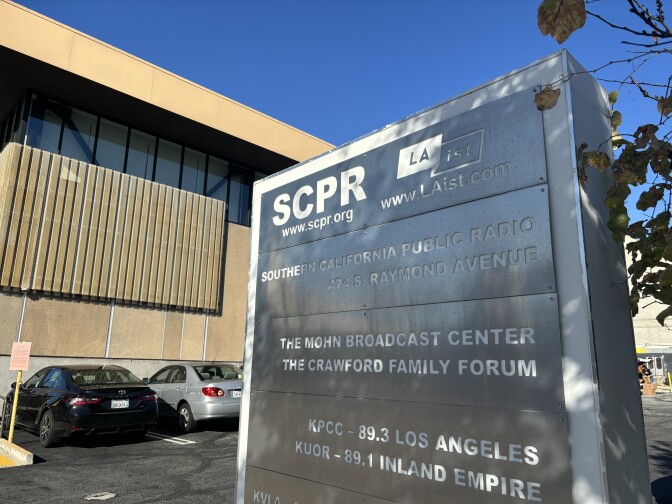This story is free to read because readers choose to support LAist. If you find value in independent local reporting, make a donation to power our newsroom today.
LAist to cut 28 employees through combination of buyouts, layoffs

Faced with ongoing shortfalls in expected revenues, LAist cut the size of its workforce by laying off seven staffers this week, the organization’s top leaders said.
The layoffs came after 21 other employees agreed to accept voluntary buyouts last month. Together, the cuts result in an approximate 17% staff reduction. Some staff who took a buyout have already departed, while others remain through the end of July.
Management explained that it offered buyouts in an attempt to forestall as many layoffs as possible, but that the buyouts failed to provide enough savings to eliminate a budget shortfall estimated at $4 million to $5 million over two years.
The actions marked the second year in a row that LAist coped with budget shortfalls by slashing staff. Last year, LAist laid off 20 employees (at the time, an estimated 10% of its staff), with management largely blaming a decline in advertising revenue from Hollywood studios.
What are SCPR's finances?
This year, management spotlighted a larger economic trend. “The traditional financial models just don’t work anymore,” LAist Chief Content Officer Kristen Muller wrote in a May email to listeners and readers. Donations provide about two-thirds of LAist’s operating revenues. “We’re reaching more people than ever,” she wrote, “[but] most advertising dollars that once supported us are now heading to giant tech platforms like Facebook and Google.”
LAist is the newish name for nonprofit Southern California Public Radio, which operates the National Public Radio affiliate LAist 89.3 FM, the news website LAist.com and the podcast producer LAist Studios.
LAist remains solvent. Its latest publicly available financial statement, for the fiscal year ending June 30, 2023, showed net assets of nearly $37 million, down from nearly $44 million the year before.
But LAist’s costs, including dues it pays to NPR to broadcast its national programming, have been rising.
Muller, the chief content officer, told donors in her email that, despite financial difficulties, “we see a path to sustainability.”
She did not describe the path, but said LAist’s journalistic ambitions remain undiminished: “We will fight to continue to hold those in power to account, to bring you the fact-based journalism that you rely on; and to tell the stories directly out of your community.”
What cost-cutting measures have been taken?
On Thursday, as layoff notifications began, Muller declined an interview request, referring a reporter to a spokesperson who issued a written statement on behalf of LAist's Management Operating Committee. The statement shed some additional light on causes of the organization's financial woes and steps it had taken to moderate them.
It attributed the woes to “a decline in advertising, the end of our investment reserves, slower-than-anticipated digital monetization, and overall cost increases that have not kept pace with revenue.”
It said that, in addition to staff cuts, LAist had engaged in “other cost-cutting measures [that] included reducing compensation for senior leaders, renegotiating several contracts to reduce expenses, and cutting third-party costs.”
No details were provided.
What is the union's position?
Caitlin Hernández, an LAist reporter who is a shop steward for journalists, producers and hosts represented by the labor union SAG-AFTRA, posted on X (formerly Twitter) on Thursday that they were “incredibly disappointed to share that we’re losing valuable colleagues.” Hernández declined to be interviewed, as did another shop steward, producer Libby Rainey, who also posted on X, “We deserve better.”
Another post on the X account associated with union members said Thursday that 11 of the 21 buyout-takers were union members, and that it was not yet known how many of those being laid off were members. At the time of that posting, those being laid off were still being notified.
What's the larger pattern?
LAist’s financial difficulties are part of a larger pattern affecting much of the American news media, which lost 3,600 digital, broadcast and print news jobs in the 13 months ending in January, according to data gathered by Challenger, Gray and Christmas, an outplacement firm that tracks layoffs. The data was reported on the Fast Company website.
Among the largest losses were those at the the Washington Post, which late last year set out to reduce its staff by roughly 10% by cutting about 240 jobs. It said it met its target through voluntary buyouts.
NBC News, MSNBC, CBS News, the Wall Street Journal and many news websites, including The Intercept, made smaller cuts.
On Wednesday, CNN announced it was cutting 100 jobs.
Closer to home, the Los Angeles Times recently cut about 115 people from its newsroom, reducing its staff by 20%. Its owner cited continuing annual financial losses of $30 million to $40 million per year.
The nonprofit Long Beach Post slashed its staff by roughly 50% when some promised donations did not come through.
A dash of hope?
Another community journalism enterprise, L.A. Taco, briefly furloughed its reporting staff this spring.
But its story, at least so far, has had a happy ending. L.A. Taco managed to attract enough new paying subscribers to bring back its staff.
As L.A. Taco investigative reporter Lexis-Olivier Ray told the media news website poynter.org last month, “It just felt like people weren’t going to let us fail….It really felt like L.A. had our back.”
LAist’s most recent member drive in June also showed a heightened level of public support. It raised nearly $790,000, surpassing its $600,000 goal.
Disclosure: This story was reported and written by Senior Reporter Ted Rohrlich and edited by Senior Editors Dana Littlefield and Ross Brenneman.
Under LAist's protocol for reporting on itself, no corporate official or news executive reviewed this story before it was posted publicly. Rohrlich, like all LAist reporters, is a member of SAG-AFTRA. He did not discuss the way this story was reported with any SAG-AFTRA members prior to publication.








